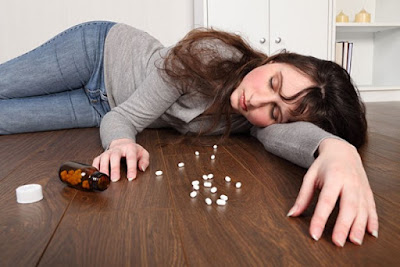“Excessive
alcohol use led to approximately 88,000 deaths and 2.5 million years of
potential life lost (YPLL) each year in the United States from 2006 – 2010,
shortening the lives of those who died by an average of 30 years,” as per the
Centers for Disease Control and Prevention (CDC) statistics.
The
dangers of alcoholism are many, both short and long-term. Not only does it
affect an alcoholic physically and mentally, it also drains the household finances.
Alcoholism is not a weakness of the mind, as most people like to believe. It is
a chronic disease and with a predictable course like every other ailment. Genes
also have a major part to play apart from life situation in alcoholism.
Alcoholism and withdrawal
symptoms
When
somebody consumes alcohol, it initially enhances the neurotransmitter level producing
a feeling of relaxation and calm. But over a period of time alcohol suppresses the
activity of neurotransmitter and more alcohol is required to produce the
desired effects. This phenomenon is known as tolerance.
In
the advent of a person quitting alcohol abruptly the neurotransmitters which
were previously suppressed by alcohol are no longer suppressed. As a result of
this cessation of alcohol they rebound, resulting in a phenomenon known as
brain hyperexcitability, and the effects are known as withdrawal symptoms which
include anxiety, irritability, agitation, tremors, seizures, and delirium
tremors (DT).
Dealing with withdrawal
symptoms
One
of the most problematic areas in alcohol detox is the nagging withdrawal
symptoms it entails. Being unable to cope with the difficult withdrawal
symptoms, people often restart drinking and relapse very often. Withdrawal
symptoms can be life-threatening for chronic alcoholics. Withdrawal from
alcohol can range from mild anxiety and shakiness to severe complications which
include seizures and delirium tremens. Since alcohol withdrawal symptoms can
gradually exacerbate, it is crucial to seek doctors’ advice. Being in the midst
of experts and clinical staff at drug and alcohol rehab centers, it is easier to handle the withdrawal symptoms.
Reaching out for help
Detoxification
from alcohol is very much possible. With some help and support from family and friends,
one can gain long-term sobriety. Though alcoholoutpatient treatment centers may not be as effective as inpatient drug rehab centers, it
depends entirely on the practitioners what kind of rehab they find more
suitable for the addicts depending on the severity of the problem.
If
you or a loved one is grappling with alcoholism or any other addiction, the 247
Recovery Helpline is willing to help. Call our 24/7 helpline number 855-441-4405
for immediate assistance. With expert advice and help, long-term sobriety is
just a phone call away.

